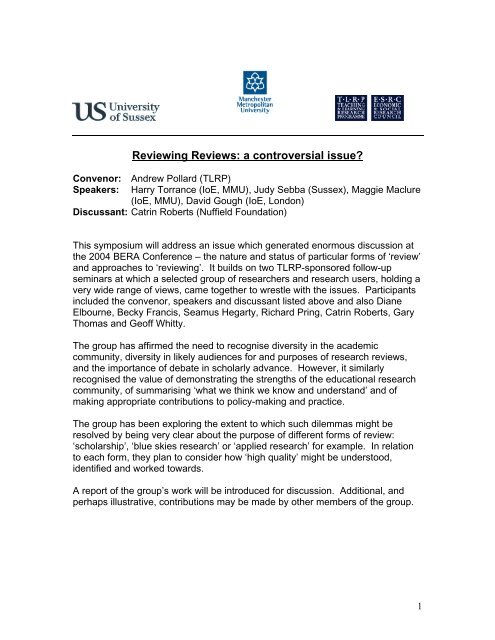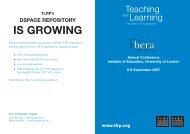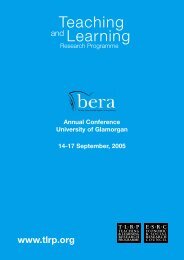Notes from the invited seminar 'Reviewing Reviews',
Notes from the invited seminar 'Reviewing Reviews',
Notes from the invited seminar 'Reviewing Reviews',
You also want an ePaper? Increase the reach of your titles
YUMPU automatically turns print PDFs into web optimized ePapers that Google loves.
Reviewing Reviews: a controversial issue<br />
Convenor: Andrew Pollard (TLRP)<br />
Speakers: Harry Torrance (IoE, MMU), Judy Sebba (Sussex), Maggie Maclure<br />
(IoE, MMU), David Gough (IoE, London)<br />
Discussant: Catrin Roberts (Nuffield Foundation)<br />
This symposium will address an issue which generated enormous discussion at<br />
<strong>the</strong> 2004 BERA Conference – <strong>the</strong> nature and status of particular forms of ‘review’<br />
and approaches to ‘reviewing’. It builds on two TLRP-sponsored follow-up<br />
<strong>seminar</strong>s at which a selected group of researchers and research users, holding a<br />
very wide range of views, came toge<strong>the</strong>r to wrestle with <strong>the</strong> issues. Participants<br />
included <strong>the</strong> convenor, speakers and discussant listed above and also Diane<br />
Elbourne, Becky Francis, Seamus Hegarty, Richard Pring, Catrin Roberts, Gary<br />
Thomas and Geoff Whitty.<br />
The group has affirmed <strong>the</strong> need to recognise diversity in <strong>the</strong> academic<br />
community, diversity in likely audiences for and purposes of research reviews,<br />
and <strong>the</strong> importance of debate in scholarly advance. However, it similarly<br />
recognised <strong>the</strong> value of demonstrating <strong>the</strong> strengths of <strong>the</strong> educational research<br />
community, of summarising ‘what we think we know and understand’ and of<br />
making appropriate contributions to policy-making and practice.<br />
The group has been exploring <strong>the</strong> extent to which such dilemmas might be<br />
resolved by being very clear about <strong>the</strong> purpose of different forms of review:<br />
‘scholarship’, ‘blue skies research’ or ‘applied research’ for example. In relation<br />
to each form, <strong>the</strong>y plan to consider how ‘high quality’ might be understood,<br />
identified and worked towards.<br />
A report of <strong>the</strong> group’s work will be introduced for discussion. Additional, and<br />
perhaps illustrative, contributions may be made by o<strong>the</strong>r members of <strong>the</strong> group.<br />
1
<strong>Notes</strong> <strong>from</strong> <strong>the</strong> <strong>invited</strong> <strong>seminar</strong> ‘Reviewing Reviews’,<br />
organised by Andrew Pollard, Judy Sebba & Harry Torrance, Institute of Education,<br />
University of London, 27/01/05; sponsored by TLRP, chaired by Andrew Pollard.<br />
Present: Diane Elbourne (am), Becky Francis, David Gough, Seamus Hegarty, Maggie<br />
MacLure, Andrew Morris, Andrew Pollard, Richard Pring (pm), Judy Sebba, Catrin<br />
Roberts, Gary Thomas, Harry Torrance, Geoff Whitty.<br />
Please note that this account of <strong>the</strong> meeting itself reflects <strong>the</strong> challenges of <strong>the</strong> issues<br />
under discussion. Harry produced <strong>the</strong> first draft and Judy commented. Finally, Andrew<br />
completed <strong>the</strong> account – and personally apologises for any errors. It is not offered as a<br />
definitive record but will hopefully jog memories and help to structure future discussion.<br />
Introduction<br />
The meeting agreed to address <strong>the</strong> ‘Purposes’ of research reviewing in <strong>the</strong> morning<br />
session (Why), and ‘Approaches’ to reviewing (How) in <strong>the</strong> afternoon.<br />
Purposes of reviewing: ‘Why’<br />
There was some initial discussion about whe<strong>the</strong>r ‘systematic reviewing’ was becoming<br />
an orthodoxy. This included some questioning of <strong>the</strong> use of <strong>the</strong> word ‘systematic’ itself,<br />
<strong>the</strong>reby positioning o<strong>the</strong>r approaches, by implication at least, as ‘unsystematic’. It was<br />
acknowledged in discussion that this may not be <strong>the</strong> intention of ‘systematic reviewing’.<br />
The early origins of systematic reviewing in <strong>the</strong> Campbell and Cochrane Collaborations<br />
were reviewed and ways in which it could be, and had been, developed and broadened,<br />
for example through EPPI, were suggested. It was felt that systematic reviewing should<br />
not be characterised as hegemonic. Indeed, it was accepted that those who are<br />
particularly interested in systematic reviewing foreground issues of quality, transparency<br />
and reliability. It was anticipated that discussions of such characteristics, and how <strong>the</strong>y<br />
may be appropriately secured, will continue to develop through academic work of many<br />
sorts.<br />
It was agreed that research reviews do indeed serve different purposes and audiences;<br />
e.g:<br />
What one might term <strong>the</strong> ‘traditional’ academic purposes of locating a study in a<br />
disciplinary field (e.g. PhD); or conceptualising an issue; alongside more specifically<br />
commissioned reviews for policymakers and practitioners who wish to make judgements<br />
about what practices are problematic, what policies are effective and thus what new<br />
empirical research, if any, needs to be commissioned. This latter purpose might be said<br />
to be addressing <strong>the</strong> need to build research knowledge within <strong>the</strong> policy-making<br />
community, ra<strong>the</strong>r than have each successive generation of decision-makers start <strong>from</strong><br />
scratch.<br />
It was agreed that <strong>the</strong>se various purposes might be summarised in terms of:<br />
• <strong>the</strong> practice of ‘scholarship’ and critical engagement with a field – i.e. identifying<br />
issues and exercising expert judgement about <strong>the</strong>ir importance to inform<br />
practice.<br />
• ‘applied research’ – reviewing what is known to inform policy development and<br />
research commissioning.<br />
2
• ‘blue skies research’ – reviewing important <strong>the</strong>oretical and substantive problems<br />
to identify key advances that require attention.<br />
These diverse purposes could result in products as varied as textbooks for students, to<br />
research proposals for funding, to reviews for government departments. It was felt that it<br />
is important to distinguish between <strong>the</strong> initial purpose identified for a review and<br />
subsequent usage once published.<br />
It was noted that <strong>the</strong>se broad categories might be construed in terms of overarching<br />
characteristics such as ‘summarising’ on <strong>the</strong> one hand and ‘problematising’ on <strong>the</strong> o<strong>the</strong>r,<br />
but equally could be sub-divided fur<strong>the</strong>r - for example, depending on user purposes,<br />
needs and capabilities. Utility and speed were also mentioned, and <strong>the</strong> push for socalled<br />
‘rapid reviews’. In this context, <strong>the</strong> complex conditions under which policymakers<br />
engage with research evidence was raised as a somewhat unexplored issue. Funder<br />
opportunity costs were also mentioned – are funds best spent on a research review or<br />
new empirical research<br />
There was also discussion of whe<strong>the</strong>r or not <strong>the</strong>se sorts of categorisations of reviews<br />
were helpful at all – <strong>the</strong> issue being not so much one of drawing up a putative taxonomy,<br />
but of recognising that <strong>the</strong> reality of reviewing in different contexts for different purposes<br />
is likely to call for different approaches at different times.<br />
It was noted that <strong>the</strong>re significant epistemological differences underpinned much of <strong>the</strong><br />
discussion – with different assumptions being made about what it is possible ‘to know’<br />
and about <strong>the</strong> degree of confidence in conclusions that different forms of review imply for<br />
particular contexts and applications.<br />
Approaches to reviewing: How<br />
Following <strong>the</strong> discussion as to whe<strong>the</strong>r or not it was helpful to try to identify distinctly<br />
different purposes and hence derive different approaches <strong>from</strong> different purposes, it was<br />
agreed to try to identify general qualities that we might wish to see reflected across all<br />
forms of review.<br />
A level of agreement emerged with respect to:<br />
1. The need to contextualise any review<br />
Why this review Why now Why this (set) of review questions Where did <strong>the</strong>y come<br />
<strong>from</strong> Who was involved in determining <strong>the</strong>m It was agreed this was partly about<br />
delineating <strong>the</strong> scale and scope of <strong>the</strong> review, but also partly about justifying it in terms<br />
of purpose, audience, and significance – why is it important to do conduct this review<br />
now<br />
2. The sufficiency of evidence<br />
There was substantial discussion about <strong>the</strong> concept of ‘exhaustiveness’ and broad<br />
agreement that reviews probably don’t have to be exhaustive in terms of finding and<br />
reviewing (or not) everything in a field, but ra<strong>the</strong>r should satisfy criteria of ‘relevance’<br />
and ‘sufficiency’ with respect to <strong>the</strong> review question. Some parallels were drawn with<br />
<strong>the</strong> inductive notions of grounded <strong>the</strong>orising and ‘category saturation’ – <strong>the</strong>re being no<br />
need to continue to search ‘<strong>the</strong> data’ if no new categories are emerging. However, <strong>the</strong><br />
application of inductive processes in reviewing was felt to require fur<strong>the</strong>r explication. It<br />
3
was also noted that consciously searching for negative instances, disconfirming cases or<br />
alternative explanations was an important element of such an approach.<br />
3. Clarification of review questions<br />
A key point to emerge was that if a review was to be specifically oriented to policy, or<br />
was commissioned by a policymaking body, <strong>the</strong>n prior negotiation over <strong>the</strong> review<br />
question would be important, with multiple inputs <strong>from</strong> diverse stakeholders. This ‘prior<br />
negotiation’ would also be important in itself with respect to <strong>the</strong> communication and<br />
indeed creation of knowledge across stakeholder communities (researchers,<br />
policymakers, etc).<br />
4. Membership of review groups<br />
With respect to constituting review groups, it was agreed that policy and user<br />
stakeholders may bring particular interests and perceptions of what was important to <strong>the</strong><br />
discussion; just as academics may bring particular perspectives on <strong>the</strong>ory,<br />
conceptualisation and methodologies. The key challenge in reviewing, as in o<strong>the</strong>r forms<br />
of analysis, was to engage with <strong>the</strong> evidence with an ‘open’ (or at least ‘reflexive’) mind<br />
and to apply appropriate criteria and judgement to its evaluation and syn<strong>the</strong>sis. The<br />
involvement of colleagues with different primary responsibilities and expertise could be<br />
valuable.<br />
5. Reviewing for policy making<br />
It was noted that ‘reviewing’ can mean different things within <strong>the</strong> policymaking<br />
community itself - it is by no means homogenous, operating with different information<br />
needs, different timescales, and different responsibilities/priorities with respect to<br />
reviewing and/or commissioning research. Discussion also explored <strong>the</strong> notion of a<br />
review of a ‘policy field’, ra<strong>the</strong>r than of a particular review question per se. It was felt that<br />
this called for a wider-ranging review with a higher degree of judgement of significance.<br />
6. Resources and models<br />
It was agreed that extensive review procedures could be time-consuming and potentially<br />
very expensive. Fur<strong>the</strong>r discussion began about different models for <strong>the</strong> conduct of<br />
reviews involving consultation, group and expert activity and <strong>the</strong> use of protocols to<br />
structure judgements. It was agreed that more work was needed on this.<br />
In summary, although a lot of issues remained unresolved, a commitment to ‘multivocalism’<br />
in review processes was noted. A range of types of review will meet different<br />
purposes for different audiences and require different ‘fitness for purpose’ methods. If<br />
multiple perspectives cannot be sought through a group, <strong>the</strong>n researchers should seek<br />
literature offering alternative and challenging views. Similarly, a commitment to a selfconscious<br />
reflexivity on <strong>the</strong> part of review groups and reviewers about <strong>the</strong> formulation of<br />
<strong>the</strong> review question and process was identified as an important part of such a process.<br />
First version, Harry Torrance, February 2005<br />
Revisions, Judy Sebba , April 2005<br />
Final version, Andrew Pollard, June 2005<br />
4

















